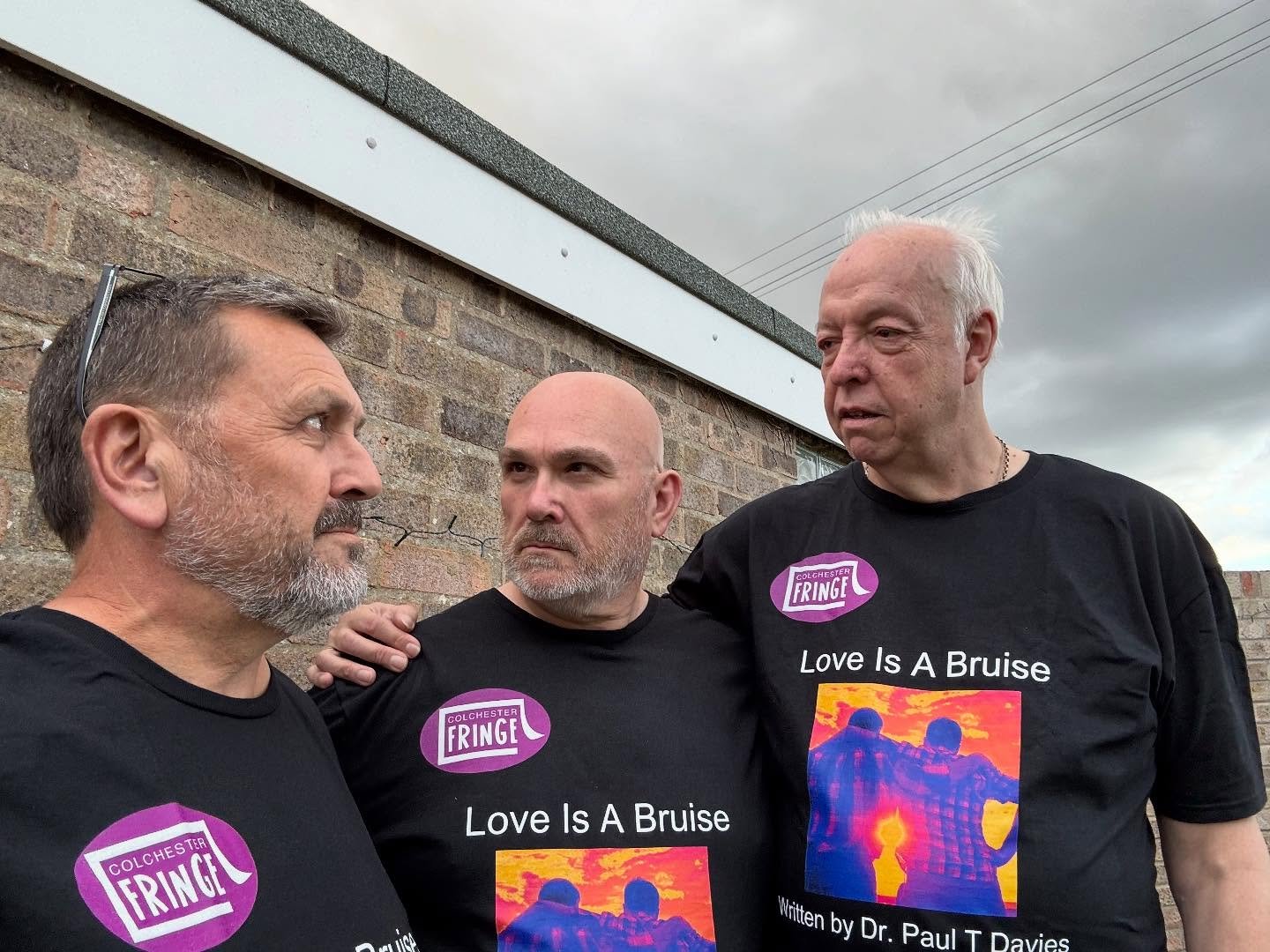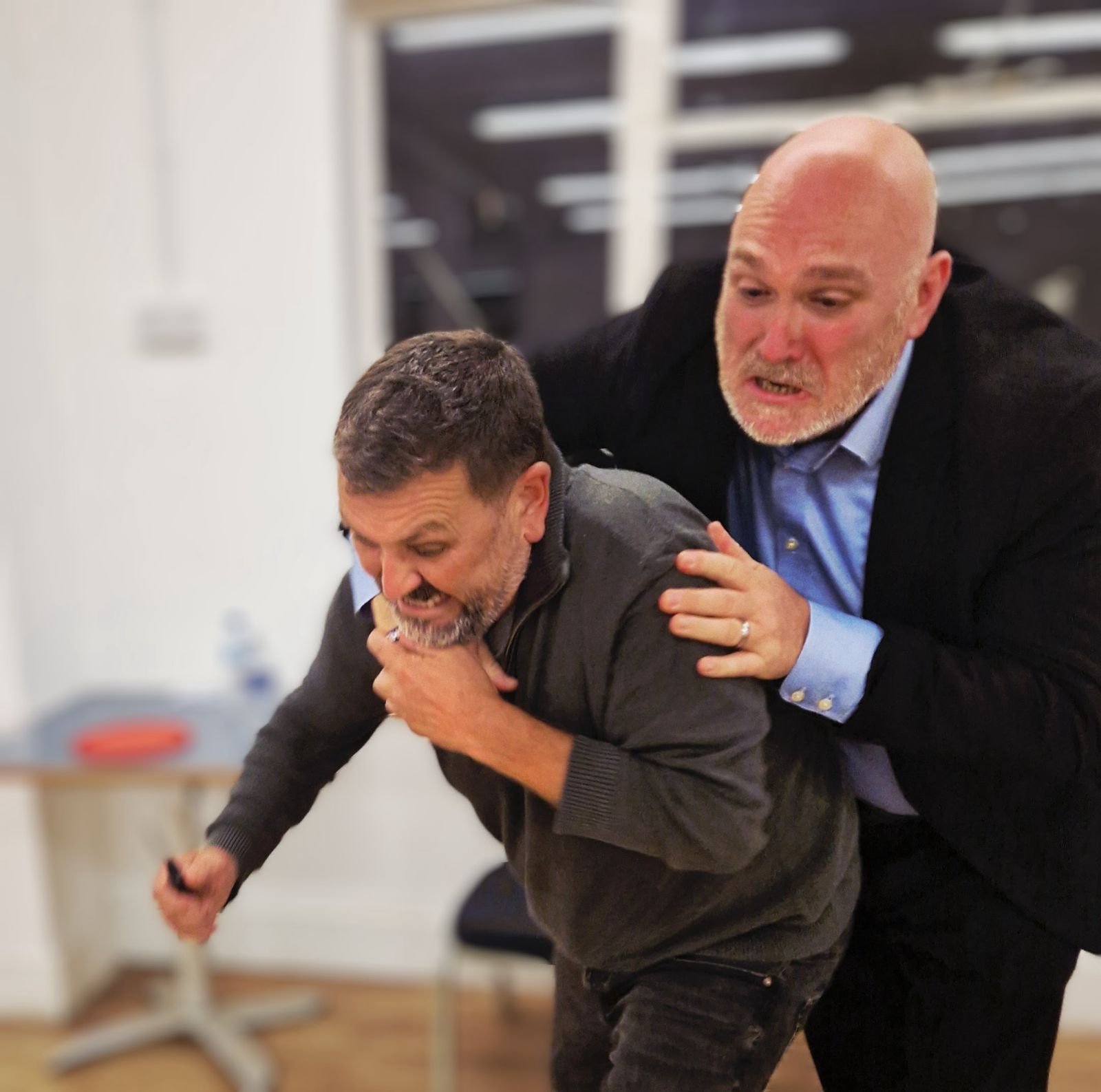Ahead of the world premiere of his new play Love Is A Bruise at the Mercury Studio as part of this year’s Colchester Fringe Festival, I caught up with Dr Paul T. Davies, writer, actor, director and Theatre Editor of Keep Colchester Cool. Known for his long-standing commitment to Colchester’s theatre scene, Paul discusses the inspiration behind the play and what audiences can expect from this intense and deeply human drama.
Paul, what first inspired you to write Love Is A Bruise? Was there a particular story, moment or idea that sparked the exploration of masculinity, sexuality and identity at the heart of the play?
It’s been a unique development, as the origins lie in a production of Bindweed at the Mercury last year. The theatre held workshops for men about masculinity as a response to the issues of the play. We were a small group of men, and we talked openly about our upbringings and how rigid views of how a man should be influenced and damaged us all. At the final session, I presented the beginning of what has become my character Dougie’s opening monologue. I met Chris and Kevin (Skip) in this group, and I wrote the characters of Nick and Ray for them.
The play examines “banter, behaviour and brotherhood” while confronting love, trauma and identity. How did you approach balancing the humour and warmth of the characters with the darker, more distressing themes?
Dougie, my character, is a “gay veteran” because I hardly ever see gay characters of my age on stage or screen. I put him into a world I know nothing about, thankfully, but I do know homophobia and having to forge and maintain your true identity. Dougie says his sense of humour is his suit of armour, and that’s where he and I mesh together. I have never written anything like this before, but especially at the beginning, my humour is there, and throughout the play, I use it to release tension. The themes are dark, and it becomes very tense, with the most menacing game of I Spy you will ever see. But sympathies will, I think, shift back and forth between these three men as they are fully rounded characters now.
Dougie, Nick and Ray each bring such distinct perspectives on love and masculinity. How did you shape their voices, and what do you hope audiences take away from seeing these three men collide in one room?
The connection between these three men is revealed as the play goes on, but we want to keep it secret, as there are a couple of twists we hope the audience won’t see coming. The collaborative work we did helped me shape their voices, and it’s been a privilege to work with two brilliant actors who have thrown themselves into creating the roles, even the most unpleasant aspects. Ray, played by Chris Austin, didn’t even have a name at the first rehearsal, but his backstory developed hugely in improvisation. Skip comes from a military background, so he was able to plug into the hypermasculinity Nick demonstrates, a complete 180 from his own personality.
But there is a fourth character, seen only via two photographs, whose struggles with his sexuality and masculinity explode into Dougie’s life, and love is the reason these men end up confronting each other and their pasts. I would like audiences to be entertained and involved, and for the play’s theme of toxic masculinity and its effects on older men to spark conversations about care, self-love, and respect, regardless of sexual orientation.
As both writer and performer, working alongside co-directors Wendy Smith and Nathanial Drury must bring unique insights to the production. In what ways has juggling these creative roles influenced your connection to the story, and what discoveries have emerged during rehearsals?
I consider Wendy Smith to be the best director in Colchester. Her approach is supportive, she challenges us to take risks, and she has a clear vision of the script. Nate was my assistant director on two productions, and I was happy to recommend him to Wendy. Luckily, they are often on the same page. I have been able to separate myself as a writer and actor, and I see Dougie as a complete character now.
For example, there’s a point when Dougie starts to go a bit mad, and it scared the life out of Skip when I first tried it. That suggestion came from Wendy, and it’s been a true collaborative process between the five of us. It gets very emotional, and we are men who are not afraid to hold each other and support each other, as well as banter very rudely.
As a veteran of theatre and LGBTQ+ activism, your work often gives voice to underrepresented stories. What conversations do you hope Love Is A Bruise will spark about sexuality, identity and the way men communicate love and vulnerability today?
I have lived in the darkness and in secret as a closeted gay man, have come into the light and have celebrated equality and diversity, and I am married to a wonderful, and some would say long-suffering, man. Now the voices against us are getting louder, and there are politicians who want to take my rights – and queer rights – away.
Love Is A Bruise is not just for gay men. I want our allies and straight people to see it. I want conversations about understanding, to discuss toxic patriarchy. It makes me fume that the rights we fought for so long are beginning to swing away from us. Experience theatre that challenges you, talk about it, laugh at the funny bits, and go away thinking about other lives different to yours.
You are well known as a champion of local arts, and of course, the Theatre Editor of Keep Colchester Cool. What does it mean to premiere this play at the Mercury Studio as part of Colchester Fringe, and how do you see local theatre shaping the city’s cultural identity?
I almost cannot put into words how proud I am to be part of this year’s Colchester Fringe. I’ve been involved since the first one, and it’s exciting to see how much it has grown. As you know, I am heavily involved with the Headgate Theatre too, and Colchester has a vibrant arts scene, and the Fringe gives us all the chance to take risks and be part of professional stages.
The Mercury Studio is a wonderful venue, and I’ve seen so many memorable shows there. It means a lot to walk out onto that stage. But where the city’s cultural identity really shows is in the reaction from our national and international artists at the Fringe. They love the experience, the venues, the warm welcome they receive, and it’s no surprise that so many artists return to the Fringe and the city. It’s a wonderful experience.
Love Is A Bruise runs at the Mercury Studio from Friday 24 to Wednesday 29 October 2025 as part of the Colchester Fringe Festival. Tickets are available now.




 10.96°C
10.96°C 